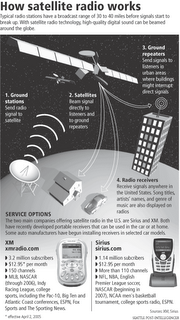2.20.2007
Rockin' satellite radio
 End of the blues for satellite radio?
End of the blues for satellite radio?Yes? No? Maybe? Will the feds tune in to a $13 billion Sirius - XM merger?
This blog is not Space Radio Probe, but personally, my ears perked up last month when Federal Communications Commission chairman Kevin Martin said the long-rumored satellite radio merger is barred because existing licensing regulations prohibit a single owner's controlling the two satellite radio operations, then waited a few days and said, of course, those rules can change.
(And there's gotta be a lawyer joke here, too, but never mind that.)
In addition to FCC hurdles, Department of Justice will look hard at the competition question here. The big key to all this will be how the market is defined. Presumably, these satellite radio companies compete not only with each other but also with iPod's, iPhones, cell phones that play MP3's and other music, traditional radio, HD radio, internet radio, podcasts, and other entertainment systems, gadgets and outlets. It's a loud, loud world.
Meanwhile, the National Association of Broadcasters (NAB), termed the proposed merger "anti-consumer" and called on regulators to tune out the deal.
What about the politics of a satellite radio deal? Last month in an article on the possible merger, the Wall Street Journal observed, "The political climate at the Republican-controlled commission has been more strained than usual since Democrats took control of Congress, and it isn’t clear that the five-member commission’s two Democrats could be persuaded to support a further consolidation of the market, given their staunch opposition to relaxing media-ownership rules."
The paper also noted, "[s]ome communications lawyers say that if the Justice Department decided not to block a merger, the FCC could likely fall in line, as it has with some recent telecommunications mergers." (But don't forget a few years ago when the FCC nixed a proposed merger between satellite TV companies DirecTV and EchoStar....)
Meanwhile, along with pressure from investors and scrutiny by the government, other issues have satellite radio business singing the blues. Lawsuits and legislation seek to prevent listeners from recording music delivered via satellite radio.
RIAA's lawsuit is going forward. On Jan 19th a U.S. District Court Judge declined to dismiss an action by the recording industry against XM Satellite radio alleging copyright violations in connection with songs downloaded by subscribers using the Inno, a combo XM radio and MP3 player that enables users to record satellite radio streams. Judge Diane Batts ruled XM paid only to be a broadcaster but was acting as both a broadcaster and distributor of licensed music.
Over on the Congressional side, a bipartisan bill -- sponsored by Senators Dianne Feinstein (D-CA), Lindsey Graham (R-SC), Joseph Biden (D-DE) and Lamar Alexander (R-TN) -- the "Platform Equality and Remedies for Rights Holders in Music" (PERFORM) Act S. 256, would mandate, among other things, that satellite, cable, and Internet broadcasters incorporate content protection technology to prevent certain copying of songs.
Also, introduced in the House this week, the familiar, annual, NAB-backed attempt to block satellite radio from broadcasting local traffic, weather, and emergency content -- here is H.R. 983, the Local Emergency Radio Service Preservation Act of 2007. (As Mediaweek points out, all "previous attempts to pass this legislation have failed.")
In any case, despite uncertainty, Wall Street apparently bullish on the deal, remains tuned in. It's sort of like Howard Stern used to boast (back in his old terrestrial radio days) about why folks who love him or hate him all keep his show turned on -- they can't wait to hear what'll happen next.
Meanwhile, consumers, here are "10 Things You Might Not Know About the Sirius-XM Merger" via Gadget Lab (And hey, don't throw away your SIRIUS and XM satellite radio comparison chart just yet....)






